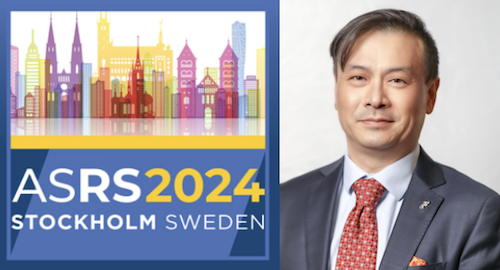Texas Retina’s Robert C. Wang, MD, presented “Safety and Efficacy of Brepocitinib, a TYK2/JAK1 Inhibitor, in Active Non-Infectious Uveitis: 24-Week Results from a 52-Week Phase II Study (NEPTUNE)” at the 2024 Annual Meeting of the American Society of Retina Specialists (ASRS) held July 17-20, in Stockholm, Sweden. This was the first presentation of unique data.
Dr. Wang discussed initial results of the NEPTUNE study, which is exploring brepocitnib, a potential new treatment for active non-infectious uveitis. Is a TYK2/JAK1 inhibitor that tackles a proposed mechanism of non-infectious uveitis—upregulation of interleukin-6 (IL-6), interleukin-12 IL-12, interleukin-23 (IL-23), and interferon gamma (INF gamma). These biomarkers are cytokines, which are secreted by certain cells within the body and play important roles in inducing and modulating immune responses, including inflammation. The NEPTUNE study is examining two different does of brepocitinib (45 mg or 15 mg daily) with a rapid steroid taper.
Dr. Wang reported that the 24-week results indicate that brepocitinib treatment appears to be dose dependent. The failure rate was 29% for the 45-mg dose and 44% for the 15-mg dose.
“These were both significantly less than a prespecified historical failure rate, demonstrating earlier control of inflammation at a longer time interval,” shared Dr. Wang. “Currently there is only one FDA-approved biologic medication for uveitis, making treatment of patients who don’t respond to it difficult. This new approach could potentially add a second strong medication with an excellent side effect profile to our armamentarium.”
Based on the favorable 24-week Phase II results, a Phase III study of brepocitnib has been initiated and will launch at Texas Retina on August 27.
Fellowship-trained in both retina and uveitis, Dr. Wang serves as Texas Retina’s director of clinical research for Plano and cares for patients in the Dallas Main, Dallas North, Plano and Sherman offices.
Texas Retina’s Rajiv Anand, MD and Ashkan M. Abbey, MD, also presented at the ASRS 2024 Annual Meeting.
About the American Society of Retina Specialists (ASRS)
ASRS is the largest organization of retinal specialists in the world, representing over 3,000 physicians in all 50 US states, the District of Columbia, Puerto Rico, and 63 countries. The Society serves as a national advocate and primary source of clinical and scientific information and education for its members.


